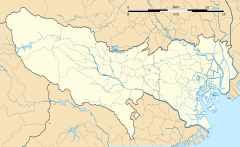Nishi-Kokubunji Station

JC17 JM33 Nishi-Kokubunji Station 西国分寺駅 | ||||||||||||||||||||
|---|---|---|---|---|---|---|---|---|---|---|---|---|---|---|---|---|---|---|---|---|
 The Chūō Line platforms in May 2022 | ||||||||||||||||||||
| Japanese name | ||||||||||||||||||||
| Shinjitai | 西国分寺駅 | |||||||||||||||||||
| Kyūjitai | 西國分寺驛 | |||||||||||||||||||
| Hiragana | にしこくぶんじえき | |||||||||||||||||||
| General information | ||||||||||||||||||||
| Location | 2 Nishi-Koigakubo, Kokubunji City, Tokyo 185–0013 Japan | |||||||||||||||||||
| Coordinates | 35°41′59″N 139°27′57″E / 35.699772°N 139.465717°E | |||||||||||||||||||
| Operated by | ||||||||||||||||||||
| Line(s) | ||||||||||||||||||||
| Distance | 32.8 km (20.4 mi) from Tokyo | |||||||||||||||||||
| Platforms | 4 side platforms | |||||||||||||||||||
| Tracks | 5 | |||||||||||||||||||
| Construction | ||||||||||||||||||||
| Structure type | At grade (Chuo Line) Elevated (Musashino Line) | |||||||||||||||||||
| Other information | ||||||||||||||||||||
| Status | Staffed ("Midori no Madoguchi") | |||||||||||||||||||
| Website | Official website | |||||||||||||||||||
| History | ||||||||||||||||||||
| Opened | 1 April 1973 | |||||||||||||||||||
| Passengers | ||||||||||||||||||||
| FY2019 | 29,577 daily | |||||||||||||||||||
| Services | ||||||||||||||||||||
| ||||||||||||||||||||
| ||||||||||||||||||||
Nishi-Kokubunji Station (西国分寺駅, Nishi-Kokubunji-eki) is a junction passenger railway station located in the city of Kokubunji, Tokyo, Japan, operated by East Japan Railway Company (JR East).
Lines
[edit]Nishi-Kokubunji Station is served by the Chūō Line (Rapid) from Tokyo to Hachiōji, and by the orbital Musashino Line from Fuchūhommachi to Nishi-Funabashi and Tokyo. It is 32.8 kilometers from the terminus of the Chūō Line at Tokyo Station and 3.9 kilometers from the starting point of the Musashino Line at Fuchūhommachi.
Station layout
[edit]
The station consists of two side platforms serving two tracks at ground level for the Chūō Line (Rapid), and two elevated side platforms at right angles to these serving two tracks for the Musashino Line. A third track lies between these two tracks for use by non-stop freight trains.
The station has a "Midori no Madoguchi" staffed ticket office.[1]
Platforms
[edit]| 1 | JC Chūō Line (Rapid) | for Nakano, Shinjuku, and Tokyo |
| 2 | JC Chūō Line (Rapid) | for Tachikawa and Hachiōji |
| 3 | JM Musashino Line | for Fuchūhommachi |
| 4 | JM Musashino Line | for Musashi-Urawa, Shim-Matsudo, Nishi-Funabashi, Tokyo, and Kaihimmakuhari |
History
[edit]The station opened on 1 April 1973.[2] With the privatization of Japanese National Railways (JNR) on 1 April 1987, the station came under the control of JR East.[2]
Passenger statistics
[edit]In fiscal 2019, the station was used by an average of 29,577 passengers daily (boarding passengers only).[3] The passenger figures for previous years are as shown below.
| Fiscal year | Daily average |
|---|---|
| 2000 | 19,674[4] |
| 2005 | 23,908[5] |
| 2010 | 26,969[6] |
| 2015 | 29,123[7] |
Surrounding area
[edit]- Musashi Kokubunji Park
- Tokyo Metropolitan Neurological Hospital
See also
[edit]References
[edit]- ^ "JR East Station Information" (in Japanese). Japan: East Japan Railway Company. Retrieved 3 June 2016.
- ^ a b Ishino, Tetsu, ed. (1998). 停車場変遷大辞典 国鉄・JR編 [Station Transition Directory – JNR/JR]. Vol. II. Japan: JTB. p. 178. ISBN 4-533-02980-9.
- ^ 各駅の乗車人員 (2020年度) [Station passenger figures (Fiscal 2020)] (in Japanese). Japan: East Japan Railway Company. Retrieved 29 January 2021.
- ^ 各駅の乗車人員 (2000年度) [Station passenger figures (Fiscal 2000)] (in Japanese). Japan: East Japan Railway Company. Retrieved 2 September 2014.
- ^ 各駅の乗車人員 (2005年度) [Station passenger figures (Fiscal 2005)] (in Japanese). Japan: East Japan Railway Company. Retrieved 2 September 2014.
- ^ 各駅の乗車人員 (2010年度) [Station passenger figures (Fiscal 2010)] (in Japanese). Japan: East Japan Railway Company. Retrieved 2 September 2014.
- ^ 各駅の乗車人員 (2015年度) [Station passenger figures (Fiscal 2015)] (in Japanese). Japan: East Japan Railway Company. Retrieved 2 September 2020.
External links
[edit]![]() Media related to Nishi-Kokubunji Station at Wikimedia Commons
Media related to Nishi-Kokubunji Station at Wikimedia Commons
- Official website (in Japanese)




